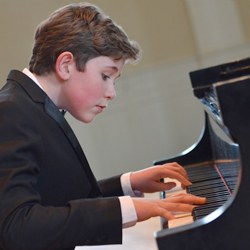by Daniel Hathaway

George’s lucid textures and singing lines beguiled the ear, even when colors turned dark in Schubert’s Impromptu, Op. 142, No. 3. Sitting quietly and gazing at the keyboard, he was the picture of concentration as he effortlessly spun out Schubert’s variations.
The pianist, who studies with Antonio Pompa-Baldi, took on Schumann’s 20-movement Carnaval as his big piece in the first half of the program. Playing with unflinchingly steady rhythm and employing a whole palette of colors, he captured the individual personalities of the masked revelers. Pianists can get lost in Schumann’s extended works, but George knew where the pathway lay. He introduced his audience in turn to Pierrot and Arlequin, Eusebius and Florestan, Pantalon and Columbine, and the warring Davidsbündler and Philistines, keeping all their stories straight.
After intermission, two large works finished out the afternoon. Chopin’s B-flat minor Sonata and Liszt’s Hungarian Rhapsody No. 2 appear frequently on the finger-busting playlists of young virtuosos. They invite over-playing of the sort Oscar Wilde probably had in mind when he said, “Nothing exceeds like excess.”
Again, in Gavin George’s capable hands, lucidity and musicality prevailed. The opening movement of his Chopin enjoyed a performance of classic proportions. Its funeral march was measured but forward-moving, its Presto finale a finely-paced toccata of relentless triplets.
In terms of flair, George did go for broke with the Liszt, but never overstrained his capacity. Most of the piece is a virtuosic cadenza, so the optional one indicated in the score seems superfluous. The pianist played one anyway, an outburst that out-dazzled the written notes. At the end, as he had done all afternoon, Gavin George bounced off the bench looking as though he’d never enjoyed anything more than playing the piano at this very moment.
The audience clamored for an encore. Rachmaninoff’s g-minor Prelude from Op. 23 did the trick for them on Sunday.
Published on ClevelandClassical.com February 15, 2017.
Click here for a printable copy of this article



